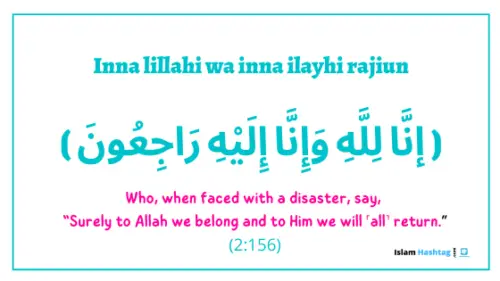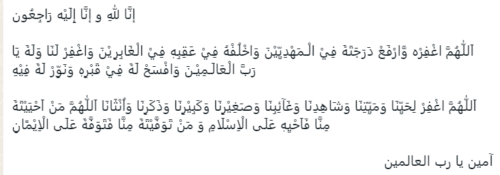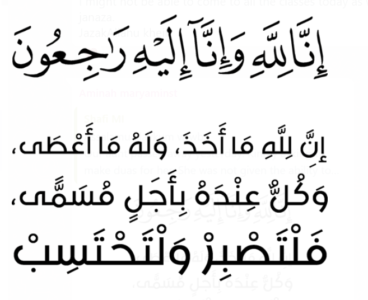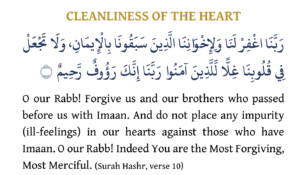Inna lillahi wa inna ilayhi raji’un
I distinctly remember the first funeral I attended where I heard the words “Inna Lillahi Wa Inna Ilayhi Raji’un” spoken in hushed, somber tones. Even as a young girl, I sensed that these Arabic words carried a weighty significance—something far deeper than the usual expressions of condolence.
Ramadan Offer
As I progressed in my Islamic studies, poring over classical works and seeking guidance from teachers, I gradually understood that “Inna Lillahi Wa Inna Ilayhi Raji’un” was not merely a phrase for moments of death. It became a spiritual tool, a consistent reminder that our ultimate refuge is with Allah in every trial we face.
Literal Meaning & Qur’anic Origin
- Arabic Text & Transliteration:
إِنَّا لِلَّهِ وَإِنَّا إِلَيْهِ رَاجِعُونَ
(Innā lillāhi wa innā ilayhi rājiʿūn) - Translation:
“Indeed, we belong to Allah, and indeed, to Him we shall return.”
This phrase features prominently in Surah Al-Baqarah (2:156). In the preceding verse (2:155), Allah mentions that every believer will be tested with fear, hunger, loss of wealth, and loss of life. Then Allah praises those who patiently persevere and declare:
“Indeed, we belong to Allah, and indeed, to Him we will return.”
By placing this statement right after mentioning life’s trials, the Qur’an underscores its role as a touchstone for fortitude. It reassures the believer that life’s pains, though inevitable, remain under divine wisdom.
Broader Context: Not Just for Funerals
Most of us associate “Inna Lillahi Wa Inna Ilayhi Raji’un” with hearing of someone’s passing. However, when taken in the broader context of Qur’an 2:155–156, the phrase applies to any misfortune or hardship:
- Loss of wealth: Financial turmoil, business setbacks
- Illness or injury: Personal health challenges, family member’s ailment
- Natural disasters: Calamities like earthquakes, floods, or storms
- Emotional setbacks: Relationship struggles, mental stress
This is not just a cultural expression reserved for condolence; it is a universal response that aligns a believer’s heart back to their Creator—acknowledging that everything ultimately begins and ends with Allah.
Spiritual Benefits & Personal Reflections
- Reinforcing Tawheed (Oneness of Allah)
By affirming that we belong to Allah, we dispel any notion of self-reliance as the ultimate solution. It redirects our dependence and hopes toward the One who owns every atom of this universe. - Cultivating Patience and Trust
Whenever I recite this phrase in moments of distress, I’m reminded that I’m not carrying my burdens alone. The very act of saying “Inna Lillahi Wa Inna Ilayhi Raji’un” infuses me with a renewed sense of calmness, urging me to trust Allah’s plan—no matter how challenging the circumstances. - Providing Perspective
Belief in returning to Allah puts worldly concerns in perspective. Life’s hardships—though painful—become stepping stones for spiritual growth. It’s a subtle reminder that our real journey is ongoing and will culminate when we return to our Lord.
Personal Note: I’ve often shared with my students that these words are like a spiritual anchor. Even in smaller upsets—like a lost opportunity or unexpected disappointments—saying “Inna Lillahi Wa Inna Ilayhi Raji’un” has kept me grounded in the bigger picture: Allah’s infinite mercy and wisdom.
We usually say inna lillahi wa inna ilayhi raji’un at the death of a person although it is a very beautiful phrase and it shows tawakkul of a person. Let us learn more about this powerful phrase. but do you know that We can say “Inna lillahi wa Inna ilayhi raji’un” even when our sandal breaks
How do you say from Allah we come to Allah we return?
We say it as إِنّا للهِ وَإِنَا إِلَـيْهِ راجِعـون in arabic and Inna lillahi wa inna ilayhi raji’un in English
Bayhaqi is shaubul iman says , also mentioned in Mishkat:
عَنْ أَبِي هُرَيْرَةَ رَضِيَ اللَّهُ عَنْهُ قَالَ: قَالَ رَسُولُ اللَّهِ صَلَّى اللَّهُ عَلَيْهِ وَسَلَّمَ: «إِذَا انْقَطَعَ شِسْعُ أَحَدِكُمْ فَلْيَسْتَرْجِعْ فَإِنَّهُ مِنَ المصائب» . رَوَاهُ الْبَيْهَقِيّ فِي شعب الْإِيمَان
Abu Huraira reported God’s messenger as saying, “When the thong of someone’s sandal breaks he should say, ‘We belong to God and to Him do we return,’ for it is one of the calamities.”
Innā lillāhi wa innā ilayhi rāji`ūn Full dua
إِنّا للهِ وَإِنَا إِلَـيْهِ راجِعـون ، اللهُـمِّ اْجُـرْني في مُصـيبَتي، وَاخْلُـفْ لي خَيْـراً مِنْـها
Innā lillāhi wa innā ilayhi rāji`ūn, Allāhumma-jurni fī muṣībatī wa ‘khluf lī khayran minhā.
We are from Allah and unto Him we return. O Allah take me out of my plight and bring to me after it something better. Hisn al-Muslim 154
| Inna: | Meaning Truly, Indeed, surely, verily ‘we’ |
| Lillahi: | We belong to Allah |
| Wa Inna: | Wa means ‘and’; Inna means ‘indeed |
| Ilayhi: | means ‘towards Him’ |
| Raji Oon: | means ‘Return’ |
Also read : La hawla wala Quwwata
Inna lillahi wa inna ilayhi raji’un image sticker
Reference of Inna lillahi wa Inna ilayhi raji’un in Quran
ٱلَّذِينَ إِذَآ أَصَـٰبَتْهُم مُّصِيبَةٌ قَالُوٓا۟ إِنَّا لِلَّهِ وَإِنَّآ إِلَيْهِ رَٰجِعُونَ
Who, when faced with a disaster, say, “Surely to Allah we belong and to Him we will ˹all˺ return.”(2:156)
‘Saying does not signify the mere making of a statement. It means a statement which is accompanied by a deep conviction in one’s heart: ‘To Allah do we belong.’ This being so, a man is bound to think that whatever has been sacrificed for God has in fact attained its legitimate end, for it has been spent in the way of the One to whom all things truly belong. And it is to Him that we are destined to return’ refers to the fact that man will not stay forever in this world and will return, sooner or later, to God.
Allah says in the next ayah: (2:157) Upon them will be the blessings and mercy of their Lord, and it is they who are rightly guided.
When do we say,” inna Lillahi wa inna Ilayhi Rajioon ” ?
1. Inna lillahiwa Inna ilayhi raji’un is not just said at the death of a person. Nabi sallalahu alaihe wa sallam used to say this whenever he suffered any hardship.
2. Saying Inna lillahi wa Inna ilayhi raji’un as Condolence at death of a Muslim
It is mustahab (desirable) to condole with the family of the dead in words like these; “May Allah forgive and have mercy on the dead! May He overlook his lapses! May he cause you all to endure the severe tragedy patiently and may He reward you all against this grief and affliction.”
3. Inna lillahi wa Inna ilayhi raji’un is also said whenever we suffer hardship.
Hadith on inna lillahi wa inna ilayhi raji’un virtue:
- Allah renews the reward of affliction
Sayyiduna Husayn ibn Ali radi allahu anhu narrated that the Prophet sallalahu alaihe wa sallam said,a Muslim man or woman suffers a hardship and recalls it, even after a long period of time and says:(We belong to Allah and to Him is our return). Allah, Blessed and Exalted, renews a reward whenever it is said like the reward for it on the day he was afflicted (mishkat 1759)
وَعَنِ الْحُسَيْنِ بْنِ عَلِيٍّ عَنِ النَّبِيِّ صَلَّى اللَّهُ عَلَيْهِ وَسَلَّمَ قَالَ: «مَا مِنْ مُسْلِمٍ وَلَا مُسْلِمَةٍ يُصَابُ بِمُصِيبَةٍ فَيَذْكُرُهَا وَإِنْ طَالَ عَهْدُهَا فَيُحْدِثُ لِذَلِكَ اسْتِرْجَاعًا إِلَّا جَدَّدَ اللَّهُ تَبَارَكَ وَتَعَالَى لَهُ عِنْدَ ذَلِكَ فَأَعْطَاهُ مِثْلَ أَجْرِهَا يَوْمَ أُصِيبَ بِهَا» . رَوَاهُ أَحْمَدُ وَالْبَيْهَقِيُّ فِي شعب الْإِيمَان
Hadith of Umm salama on Inna lillahi wa Inna ilayhi raji’un
Umar bin Abu Salamah narrated from his mother, Umm Salamah, that the Messenger of Allah (ﷺ) said:“When a calamity strikes one of you, then let him say: ‘Indeed, to Allah we belong and to Him we shall return. O Allah, I seek reward with You for my affliction, so reward me for it, and replace it for me with something better (Innā lillāhi wa innā ilaihi rāji`ūn, Allāhumma `indaka aḥtasibu muṣībatī fa’jurnī fīhā wa abdilnī minhā khair).’”
When the time of death was near Abu Salamah, he said: ‘O Allah, replace me for my wife, with better than me.” So when he died, Umm Salamah said: “Indeed, to Allah we belong and to Him we shall return. I seek reward with Allah for my affliction, so reward me for it.”Jami` at-Tirmidhi 3511
إِنّا للهِ وَإِنَا إِلَـيْهِ راجِعـون ، اللهُـمِّ اْجُـرْني في مُصـيبَتي، وَاخْلُـفْ لي خَيْـراً مِنْـها
Innā lillāhi wa innā ilayhi rāji`ūn, Allāhumma-jurni fī muṣībatī wa ‘khluf lī khayran minhā.
We are from Allah and unto Him we return. O Allah take me out of my plight and bring to me after it something better. Hisn al-Muslim 154
Narrated Umm Salamah:The Messenger of Allah (ﷺ) as saying: When one of you is afflicted with a calamity, he should say: “We belong to Allah, and to Him we do return.” O Allah, I expect reward from Thee from this affliction, so give me reward for it, and give me a better compensation. Sunan Abi Dawud 3119
It was narrated from Umm Salamah that Abu Salamah told her that he heard the Messenger of Allah (ﷺ) say:“There is no Muslim who is stricken with a calamity and reacts by saying as Allah has commanded: ‘Inna lillahi, wa inna ilayhi raji’un. Allahumma indaka ahtasabtu musibati, fajurni fiha, wa ‘awwidni minha (Truly, to Allah we belong and truly, to Him we shall return. O Allah, with You I seek reward for my calamity, so reward me for it and compensate me),’ but Allah will reward him for that and compensate him with something better than it.”
She said: “When Abu Salamah died, I remembered what he had told me from the Messenger of Allah (ﷺ) and I said: ‘Inna lillahi, wa inna ilayhi raji’un. Allahumma indaka ahtasabtu musibati, fajurni alaiha (Truly, to Allah we belong and truly, to Him we shall return.
O Allah, with You I seek reward for my calamity, so reward me for it).’ But when I wanted to say wa ‘awwidni minha (and compensate me with better), I said to myself: ‘How can I be compensated with something better than Abu Salamah?’ Then I said it.
Practical Tips for Incorporating It
- Immediate Response to Bad News
Make it a habit to respond with “Inna Lillahi Wa Inna Ilayhi Raji’un” the moment you receive distressing information—be it personal or about someone else’s struggle. - Teach It to Children
Children might assume it’s only for sombre gatherings. Encourage them to recite it whenever they’re upset, lose something valuable, or feel overwhelmed. This early training helps them internalize a healthy, faith-based response to life’s frustrations. - Use It Beyond Loss
If you missed a train, faced an unexpected expense, or experienced a minor disappointment—“Inna Lillahi Wa Inna Ilayhi Raji’un” can still realign your heart toward divine wisdom.
Conclusion
“Inna Lillahi Wa Inna Ilayhi Raji’un” holds a profound place in a believer’s spiritual toolkit, reminding us that life is a test, our destinies belong to Allah, and our final return is to Him. By voicing these words in moments of sorrow, we transform despair into hope, confusion into clarity, and helplessness into trust.
Next Step: Take a moment to internalize its meaning the next time adversity strikes—big or small. Let these words soften your heart and broaden your perspective. After all, recognizing that everything ultimately returns to Allah is both humbling and liberating. May we all find comfort, patience, and an unshakeable connection with our Lord through every hardship that crosses our path.
Key Takeaway: We don’t just say “Inna Lillahi Wa Inna Ilayhi Raji’un” for closure at the end of a life; we say it to acknowledge Allah’s sovereignty and maintain our spiritual resilience in all of life’s twists and turns.
Additional Resources
Discover more from Islam Hashtag
Subscribe to get the latest posts sent to your email.








